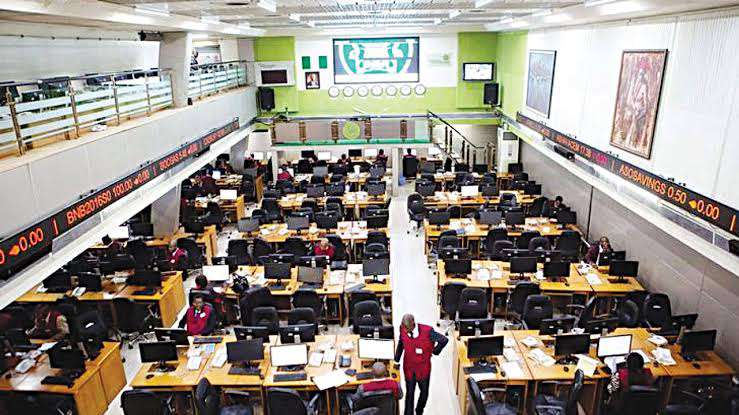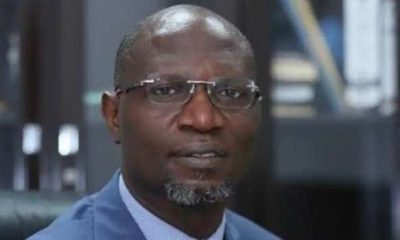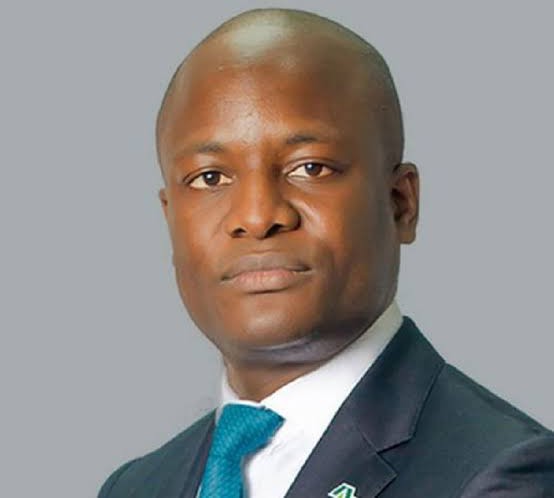Economy
Mixed outlook for the equities market in 2024

After a year of anguish, poverty, a depressed economy, high inflation, and huge debt, the Nigerian bourse achieved a record 46.6 percent gains.
This came after the nation’s equities market also finished the year 2022 on a bullish run as the NGX All-Share Index appreciated by 19.98% to close the final trading day of the year on 30 December 2022 with 51.251. This contradicts the assertion that the capital market is the barometer for measuring the economy. Claims are that the market rode on a couple of market-friendly reforms that boosted share prices and drove the benchmark equity index to its all-time high of 74.773.77 basis points at year-end.
Whatever may be the case, the All-share index jumped from 51,595.66 in January 2023 to 74,773.77 on December 31, 2023. However, some analysts have marveled how an economy that may be described as suffering stagflation with an excruciating macroeconomic atmosphere produce a record bullish market.
The Economy:
Experts agree that when the economy is down income and employment decline; stock prices fall as companies struggle to sustain profitability. They also observed that a sign that the economy has entered the trough phase of the business cycle is when stock prices increase after a significant decline. Yet the equities market sentiments remained bullish.
THE MARKET IN 2024
Some optimists are of the view that the market has huge prospects this new year. The outlook for Nigeria’s equities market in 2024 appears optimistic, driven by several factors that contribute to a positive investment climate. Key considerations for the equities market in Nigeria for the year:
1. Renewed Investor Confidence: The Nigerian Exchange Limited (NGX) closed 2023 positively, fostering renewed investor confidence. This positive momentum is expected to carry over into 2024, creating a favorable environment for investment.
2. Leadership Appointments: The recent leadership appointments, including Mr. Temi Popoola as the GMD/CEO designate of the Nigerian Exchange Group Plc (NGX Group) and Mr. Jude Chiemeka as the Acting CEO of NGX, are likely to instill confidence in market participants. A smooth transition and the expertise of these professionals contribute to a positive market sentiment.
3. Anticipated Primary Market Activity: Market operators foresee a focus on the primary equities market in 2024. The expectation is that there will be more listings, and manufacturers, whose balance sheets may have been affected by previous market reforms, are likely to seek capital in the coming year.
4. Private Capital-Based Developmental Projects: The confidence in 2024 is drawn from President Bola Ahmed Tinubu’s 2024 budget proposal, which emphasizes the use of private capital for funding crucial developmental projects. This focus on private capital is anticipated to drive positive developments in the equities market.
5. Improving Macroeconomic Conditions: Despite macroeconomic challenges, financial experts anticipate a positive market in 2024. The hope is that the economy will readjust to a new price level, and the commencement of domestic refining of crude oil is expected to have positive effects on forex and petroleum product prices.
6. Continued Military Action and Stability: The commodities ecosystem is expected to be active in 2024, especially if current military actions against bandits, terrorists, and insurgents are sustained. Stability in the security situation contributes to a conducive investment environment.
7. Shareholders’ Expectations: Shareholders express optimism for the coming year, expecting sustained market performance. Their expectations include addressing issues such as the floating of the Naira, providing a conducive business environment, and curbing inflation to encourage business growth.
8. Strategic Government Policies: The equities market’s performance is influenced by government policies. Shareholders call for policies that promote good corporate governance, business ethics, and confidence, encouraging companies to participate in the market. While the outlook seems mixed, it’s essential to remain vigilant to potential challenges, such as external economic shocks, global market fluctuations, and geopolitical uncertainties, which could impact the equities market in Nigeria in 2024. Market analysts warn that investors should stay informed about market dynamics and adapt their strategies accordingly.
Experts are Optimistic
Executive Vice Chairman, of Hicap Securities Limited, Mr. David Adonri told Business Hallmark that the macroeconomic situation of the country was not impressive given the galloping inflation which rose from 21.5% in January 2023 to 28.2% in November 2023. Adonri in his analysis said the GDP growth rate did not meet expectations ending Q3 with 2.54%. He explained that following market reforms, the Naira depreciated from N449.05/$1.00 in January 2023 to N802/$1.00 in December at I&E Window. Adonri however, observed that the macroeconomic situation was expected to improve in 2024 given that the economy readjusts to a new price level. He further hinged his optimism on the commencement of domestic refining of crude oil is expected to have a salutary effect on forex and petroleum product prices.
For the Chief Executive Officer of Wyoming Capital and Partners, Tajudeen Olayinka, the market has a lot going for it that will prompt positive results in 2024. He opined that the 2024 budget proposal of President Bola Ahmed Tinubu, lays emphasis on harnessing private capital in funding some important developmental projects in the country.
Bismarck Rewane, chief executive officer at Financial Derivatives Company, who projected that Nigeria’s economy will grow by 3.3 percent in 2024 from 2.61 percent expected for 2023 said that a slowing economy and possible recession might influence corporate profits and affect their asset prices.
He opined that leveraging the growth potential of artificial intelligence was capable of contributing to corporate margins.
Afrinvest research believes that the ability of the government to push the right policies with determination is what could grow the economy. “Looking ahead into 2024, economic outcomes would depend on how the current administration can (i) carry through with the ongoing reforms, (ii) improve the business environment to end the recent spate of closure by mid and large-sized business entities (iii) improve national security, (iv) enhance internal shock absorbers to external risks, and (v) narrow structural gaps. Based on our scenario models, GDP growth, inflation, and FX rate would average 3.0%, 22.1%, and ₦918.89/$ in the 2024 blue-sky case, while the average outcomes could deteriorate to -1.5%, 24.7%, and ₦1,057.19/$ should policy fatigue set in and external risks mount.”
Yet there is subtle anxiety and uncertainty in the projections of the new year
Cautionary Views
On the contrary, the present economy does not support the optimism that the equities market would sustain a bullish run in 2024. A few market observers say the equities market is unpredictable when you look at what the general economy reveals. First, the federal government has pegged Nigeria’s budget deficit for the 2024 fiscal year at N9.18 trillion. This means more borrowing in addition to the humongous debt stock of N88 trillion, creating fears of debt unsustainability.
The President had in a breakdown of the 2024 Appropriation Bill said: “Accordingly, an aggregate expenditure of N27.5tn is proposed for the Federal Government in 2024, of which the non-debt recurrent expenditure is N9.92tn while debt service is projected to be N8.25tn and capital expenditure is N8.7tn. Nigeria remains committed to meeting its debt obligations. The projected debt service is 45 percent of the expected total revenue.
“The budget deficit is projected at N9.18tn in 2024 or 3.88 percent of GDP. This is lower than the N13.78tn deficit recorded in 2023, which represented 6.11 percent of GDP. The deficit will be financed by new borrowings totaling N7.83tn, N298.49bn from Privatisation Proceeds, and N1.05tn draw down on multilateral and bilateral loans secured for specific development projects.’’
Many have described the budget as uninspiring.
Unfortunately,the naira also finished the year as the world’s worst-performing currency after the Argentine peso and the Lebanese pound among the 151 currencies tracked by Bloomberg.
The currency of Africa’s largest economy has been significantly devalued, experiencing a roughly 40% decline in June, leading to a continued free fall and leaving it severely weakened.
More so, the Nigerian economy remains in dire straits. About 60%(100m-130m) of Nigerians are wallowing in extreme poverty; food production is expected to decline given fertilizer shortages due to the Russia/Ukraine war and insecurity; Nigeria has also not fully recovered from the devastating impact of Covid-19; the growing insecurity which has hampered agricultural activities is taking a different toll on Nigeria’s food security; food inflation according to NBS stood at about 30%; over N9.18trillion deficit is tugging at the N28trillion budget for 2023; debt servicing takes over 95 percent of revenue; the value of the naira keeps declining to about N950/a dollar due unification of exchange rate policy and the Country remains unproductive; unemployment and underemployment rates remain high. While headline inflation continues to jump to about 30% fueled by the removal of subsidy with a liter of pms climbing from N195 to over N600, total remittances continue to dwindle.
As a result of the macroeconomic challenges, local participation in the equity market drove activity this year, accounting for 88 percent or 2.9 trillion of total trade as of November, according to the NGX Foreign Portfolio Investment Report.
Foreign investors only contributed 11.2 percent or N362.8 billion, lower than the 16.7 percent of N364 billion in 2022. The decline mirrors the dilemma of attracting international investors to Nigerian stocks, in which investors from abroad are reluctant to invest.
Last year, the DMO boss, Patience Oniha, had said the country risked the debt sustainability issue if it failed to grow the current low revenue profile, which places the country in the poorest category among its peers. “We should focus on revenue. The good thing about it is that the Minister of Finance, Budget, and National Planning has started a program aimed at growing the revenue profile. We must discipline ourselves to follow through to grow our revenue. If we continue to borrow and do nothing about growing our revenue base as other countries have done, we may have a debt sustainability challenge,” she said
Market analysts are wondering what strong sentiment could be driving the value of the market especially presently, without strong fundamentals
Former deputy governor of the Central Bank of Nigeria (CBN) Prof. Kingsley Moghalu described the Nigerian economy as distressed and bankrupt.
‘’Nigeria’s economy is deeply distressed. Nigeria is practically bankrupt. There is no question in my mind about that. Poverty has increased to an unconscionable degree, unemployment is about 40%, and the Naira is in distress. Yes, the economy is in bad shape and there is no question about it.’’ Moghalu had said
Unfortunately, pessimists still think the government’s economic vision has not really offered hope to the citizenry. While the government is still struggling to implement its promises to lift the economy, the faces of Nigerian citizens still look frustrated and sour.
Nevertheless, findings by BH reveal that whereas the market is still bullish, it is difficult to predict with any amount of certainty its future.
Details show ,the equities market had gained 65% in 2003; 18.5%in 2004; 1.01% in 2005; 37.80% in 2006; 74.73% in 2007; and lost -45.77% in 2008. It also lost -33.80% in 2009 and took a rebound to gain 18.50% in 2010. The market slipped back in the negative by -17% in 2011, gained – 35.4% in 2012, gained 47.19% in 2013, lost by -16.14% in 2014 and closed in the negative by about -17.3% in 2015, -6.14% in 2016, +43.34% in 2017, -17% in 2018,-14.6% in 2019,+6.23% in 2020,+6.1% in 2021 and +19.98% in 2022 and 46.6% in 2023.










